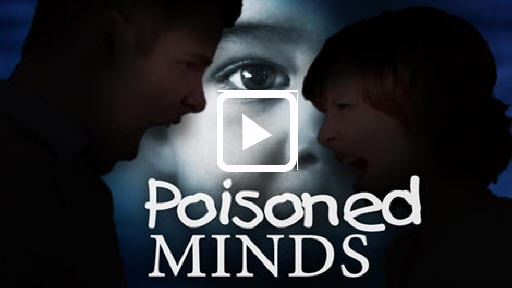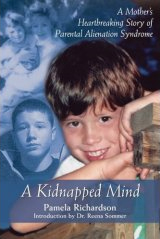The Fathers Guide: Coping with Parental Alienation
The following is from material published by Fathers for Equal Rights Inc. (FER), Dallas & Houston, Texas, U.S.A.
Non-custodial parents often face a continuing dilemma, knowing how to respond to certain mind-programming propaganda that the children receive from the custodial parent. Every reference to the non-custodial parent is couched in negative words: "lazy, irresponsible, un-loving, and cheapskate," to name a few. The children's emotions and behavior patterns that result from this negative programming have been officially dubbed by the psychological community as the Parental Alienation Syndrome , and when the parent doing the alienation has full-time access to the children, the consequences can be devastating to the relationship between the child and the other parent. It is also devastating to the child as the child comes to realize that half of who they are, is a product of that "low life" other parent.
Parental alienation deprives the children of their right to know that they have two parents who love them. Regrettably, the parent responsible for the alienation seldom realizes or cares that such deprivation is a form of psychological child abuse. Life becomes difficult enough for the targeted parent, but the children are the real victims of the immature behavior from a parent with vengeance in their head and heart.
How should non-custodial parents respond, knowing that our children are being programmed to hate? Human nature says, "Get even take advantage of every opportunity to reverse the picture, and let the children know how crafty and calculating the other parent really is ... what evil lurks in their heart!" Of course, the problem with this solution is that it is no solution at all; it only compounds the problem. Children don't need both parents making villains of each other!
Clearly, the solution must include a self-imposed rule that "I will never, in the presents of the children, say anything bad about the other parent, "however lack luster that approach may seem. Children must never be made hockey-pucks in a standoff between two embittered adults; nor should they be put into a position of having to take sides to gain the approval of either of their parents. Where the facts support a negative opinion about either parent, the children will eventually reach that conclusion on their own.
Meanwhile, the best way to over come parental alienation, is to continue to be the best parent we know how to be. We must use what time we do have with the children in positive, constructive ways to demonstrate that we are mature, responsible, and loving parents. Indisputably, this approach requires that we have frequent access to our children, and where that is lacking, we must work to rectify that problem first.
If we aren't seeing our children because we have become too busy, we must re-vamp our priorities and put the children up-front. If we aren't seeing them because we are being denied court-ordered access, we need to pursue the legal remedies that are available. The volunteers who work in our office can share their experiences with this process and the attorneys at our Saturday seminars can explain, in detail, these remedies. These legal solutions will not be explained here, other than to mention the possibility of requesting a court order for the children and the hostile parent to accompany you to family therapy to begin rebuilding the parent-child relationship. If therapy fails, it may become necessary to remove the children from the hostile environment, through a deviation from the standard possession order, to protect the children's emotional well-being.
Once we do establish regular access to our children, the first visits can be awkward, knowing that everything we do or say is being evaluated through not-so-rosy colored glasses. The following suggestions have been made to some of our TFER members by various psychologists, counselors, and members of the clergy, for rebuilding relationships in the wake of parental alienation.
1. Chart your own course of action. When your allow another persons behavior to determine your own action, you are controlled by that person. Other people can control you, only to the extent that you let them. Decide for yourself how you are going to interact with your children, and don't allow anybody to stop you.
2. Redefine the meaning of "I hate you!" You are likely to hear this heart-breaking phrase more than once, and its essential to your mental health that you put hatred into a proper perspective. Hate is not the opposite of love; the opposite of love is indifference and disregard. Hate is more like another dimension of love ... when your child hollers, "I hate you!," he is really saying, "I'm still very much emotionally involved with you and right now, it happens to be negative!" When you understand hatred in this context, you don't have to start-out feeling totally defeated; you begin working to slowly, gradually re-route the negative emotions into more positive ones.
3. Do "commercials" for yourself, but don't overdo it. There is little benefit to be gained by a marathon-style denial of accusations which you believe have been made. Its more productive to plant a few positive / constructive seeds for future germination ... and then cultivate that garden. Help the children to recall the closeness, or togetherness that once existed between you. For example, "remember when you were little, how we used to go to Indian Princess campouts (or ride bicycles, or whatever) together? ... I enjoyed that ... how about you? What did you like most about it?" We can also use ordinary daily events to our advantage, such as if a child asks us to lie for them. We can instil our personal values in the child by responding, "No dear, I wont lie for you; and you don't really want me to anyone who will lie for you will lie to you."
4. Remember that "money cant buy me love." You need not run an extravagant "daddy's weekend Disneyland" to let the kids know that you love them. Your time and attention mean more than some lavish show, so hold the spending to a level that you can comfortably afford. Overspending conveys the message that "you can use me and abuse my finances, in the name of love." It says, I am a sucker, and you can manipulate me by using the word love. When we overspend to gain approval, we receive false, temporary affection, at best, and set ourselves up for future disappointment. We must be cautious not to teach the children that a certain amount of dishonesty, or manipulation, in relationships is okay. Instead, we should lavish them with time, affection, concern and involvement.
5. Discipline the children! As the non-custodial parent, we sometimes find it easier to let the children get-away with things, than to correct inappropriate behavior and risk re-igniting the children's hatred for us. Yet, we must let the children experience the natural consequences of their actions, insisting that they assume full ownership of their own behavior. Let them know the boundaries and the consequences of unacceptable behavior. Then be firm and consistent in enforcing the consequences.
6. Understand the teenage mind. Once the children enter into adolescence, we must learn to distinguish between the withdrawn, rebellious, obnoxious behavior which stems from the mere fact that they are teenagers, and the behavior / attitudes that result from parental alienation. The "Teenage Psyche" chapter of Bob Meehan's book Beyond the Yellow Brick Road (Farnsworth Publishing) will help us to remember the inner conflict created by the teenagers urgent need to gain a sense of independence, while still having strong emotional ties to his parents. We must learn to "let go" when our teenagers would rather be with their friends than with ourselves, and must not confuse the emerging independent streak with the parental alienation syndrome. Don't take it personally!
7. Let the children learn at their own pace. If your child occasionally surprises you with a comment about the other parent, which indicates that the child is thinking for himself and beginning to figure things out, you must resist the temptation to offer "supplemental thinking" to reinforce the child's conclusion. The child must do this thinking for himself, at his own pace, to make it meaningful and lasting.
8. Refuse to be crippled by parental alienation. When we allow ourselves to get caught-up in obsessive "poor me" thinking, we pick-up a crutch that prevents forward movement; then we stagnate in a pool of self-pity and become ineffectual at acting in the best interest of the children. We are reacting, rather than acting. We must avoid that rut by defining realistic parent-child relationship goals, then constructing a positive action plan for achieving them. Sometimes we will find it necessary to revise the goals and the action plan, and that doesn't necessarily mean we have failed it means that we are dealing constructively with the reality of ever changing circumstances.
We acknowledge that we have "lost" our children for the short-term; now we will go for the long-term, knowing that it will take time, patience, and persistence. What happens in the children's other household is beyond our control, but we can take effective control of our own lives, always seeking "the serenity to accept the things I cannot change, the courage to change the things I can, and the wisdom to know the difference."
Suggested Reading: The Parental Alienation Syndrome and the Differentiation Between Fabricated and Genuine Child Sex Abuse, by Richard A. Gardner, M.D., Cresskill, NJ, Creative Therapeutics, 1987.








